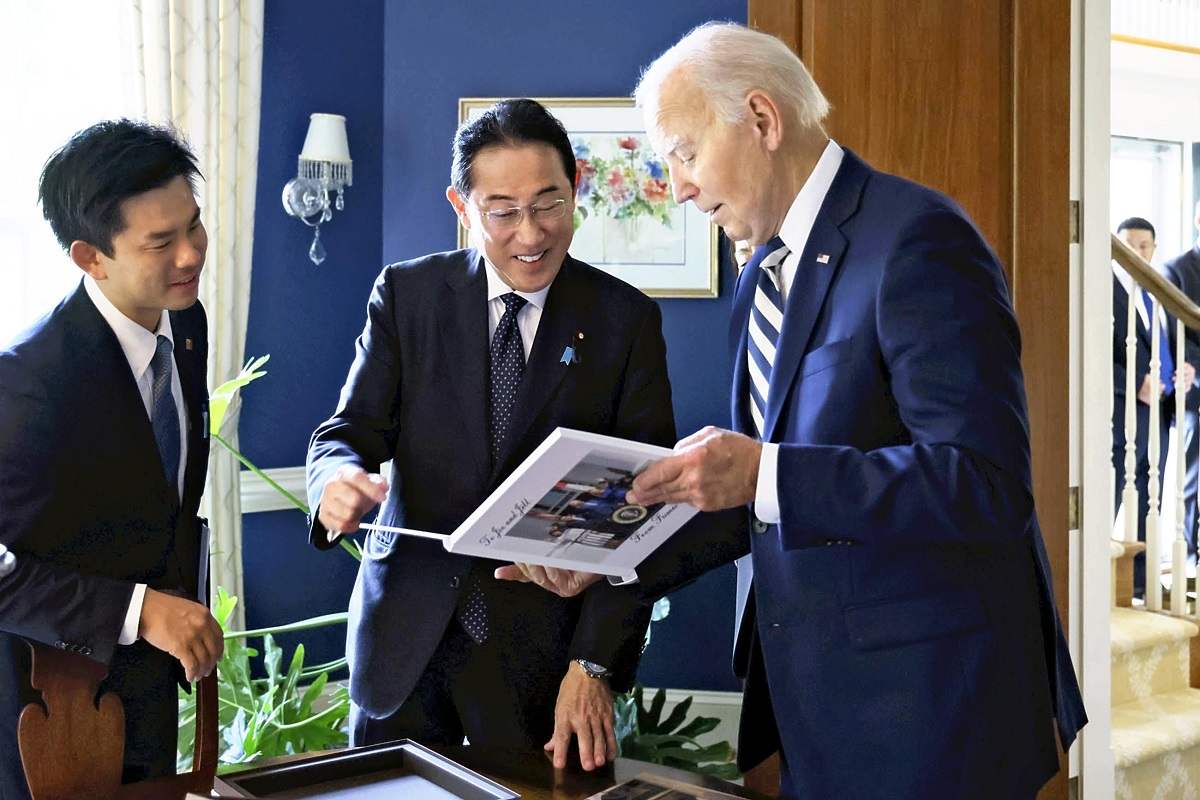Outgoing Japan Leader Looks to Highlight Diplomatic Record, Makes Final Overseas Trip For Talks with Biden, Quad Nations

Prime Minister Kishida, left, chats with U.S. President Biden at Biden’s home in Wilmington, Del., on Saturday.
1:00 JST, September 24, 2024
WILMINGTON, Del. — Prime Minister Fumio Kishida appealed for stronger cooperation during his meeting with U.S. President Joe Biden and during a summit of the Quad nations — Japan, the United States, Australia and India — in Wilmington, Del., on Saturday.
Kishida has worked to strengthen Japan-U.S.-based multilateral cooperation, with China in mind. He is believed to be hoping that his current visit to the United States will mark a high point in his diplomacy — an area in which Kishida excels — and that he can pass the torch to the next prime minister, who will continue on his diplomatic path.
This will be Kishida’s last overseas trip as the leader of Japan, as he is expected to leave office soon.
Kishida said at the start of the Quad summit that he had consistently emphasized the efforts of Japan, the United States, Australia and India during his tenure. The Quad gathering was the most appropriate meeting for him to attend during his final overseas trip as prime minister, he said.
This was the sixth Quad summit, including two video conferences, and the fourth in which Kishida has taken part.
During the meeting, Biden reflected on the Quad gathering held in Hiroshima — Kishida’s home turf — in May last year and touted the strengthened collaboration among its members. The Wilmington Declaration released at the summit said, “Four years since elevating the Quad to a leader-level format, the Quad is more strategically aligned than ever before.”
Kishida and Biden are prioritizing the Quad due to their sense of alarm toward China, which continues to heighten its aggressive military activities in the East and South China Seas.
In recent years, the Biden administration has been increasing its involvement in the Indo-Pacific region, regarding the issue as a top priority in its foreign policy. Kishida has facilitated cooperation among Japan, the United States and South Korea by improving relations with South Korea while working to drastically strengthen defense capabilities.
Japan and the United States are also working quickly to strengthen their cooperation with the Philippines, which has a territorial dispute with China in the South China Sea.
Kishida was invited to Biden’s private residence in Delaware during his latest visit, providing an opportunity to impress the world with their close relations. The president praised Kishida’s “visionary and courageous leadership over the past three years, which has fundamentally enhanced Japan’s defense capabilities and transformed its role in the world.”
He thanked Kishida for “advancing a free and open Indo-Pacific region.”
Kishida called for the need to expand collaboration between multiple countries, including the so-called Global South emerging and developing countries.
However, the outlook is shadowed by uncertainty since the leaders of Japan and the United States will change soon. Also, Southeast Asian countries value their relationship with China.
It is unclear how far the multilateral cooperation framework can be expanded beyond the Philippines. Attention will be focused on how the new Japanese and U.S. leaders will maintain and strengthen that framework.
Top Articles in Politics
-

Japan PM Takaichi’s Cabinet Resigns en Masse
-

Sanae Takaichi Elected Prime Minister of Japan; Keeps All Cabinet Appointees from Previous Term
-

Japan’s Govt to Submit Road Map for Growth Strategy in March, PM Takaichi to Announce in Upcoming Policy Speech
-

LDP Wins Historic Landslide Victory
-

LDP Wins Landslide Victory, Secures Single-party Majority; Ruling Coalition with JIP Poised to Secure Over 300 seats (UPDATE 1)
JN ACCESS RANKING
-

Producer Behind Pop Group XG Arrested for Cocaine Possession
-

Japan PM Takaichi’s Cabinet Resigns en Masse
-

Japan Institute to Use Domestic Commercial Optical Lattice Clock to Set Japan Standard Time
-

Man Infected with Measles Reportedly Dined at Restaurant in Tokyo Station
-

Israeli Ambassador to Japan Speaks about Japan’s Role in the Reconstruction of Gaza





















